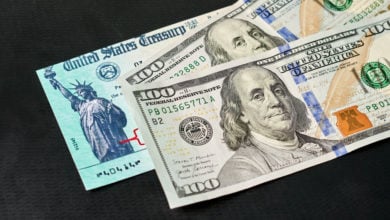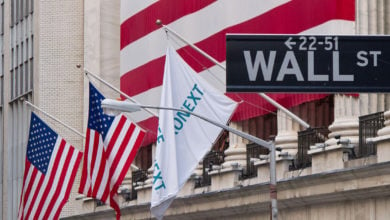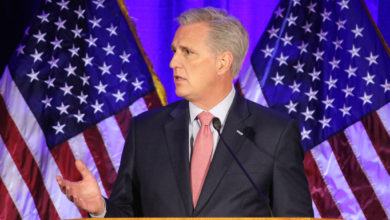
When Congress passed the $2 trillion Coronavirus Relief Bill last month, it included a whopping $500 billion in “corporate aid” – tax credits, guaranteed loans and more, giving a major boost to the declining stock market, according to the Wall St. Journal. This was entirely a government gift to big corporations. The lending program came with no requirement that beneficiaries keep workers on payroll and no restrictions on stock buybacks, dividends or executive pay. For example, at least $17 billion went to the already the cash-rich Boeing, the world’s largest aerospace company, to ensure “national security,” sending its stock up 24 percent. This didn’t stop Boeing from announcing a layoff of 16,000 workers shortly after.
Such give-aways weren’t enough for Corporate America, which also noticed that Congress had earmarked $350 billion for small businesses. They saw that these funds had a large loophole. Money which could have gone directly to the hundreds of thousands of actual small businesses desperate to keep afloat would be administered by the large banks, such as JP Morgan Chase & Co., Bank of America, Wells Fargo & Co and Citigroup. The very idea that the banks wouldn’t take advantage of this is like trusting a hungry Godzilla not to eat your cat.
Charged $10 billion in processing fees
This was a government giveaway to the banks, which made a quick $10 billion in processing fees alone on the loans. They explained that they paid themselves for the “complicated vetting procedures” required for processing each application. This is strange, because the federal government guaranteed each loan, required less vetting than regular loans, and presented no risk to the banks involved.
These banks also restricted access to the small business funds to all but their wealthiest corporate clients. Nearly all private and commercial banking clients who applied for a small business loan got one, whereas only 1 out of 15 retail banking customers who sought loans got one. JP Morgan, the nation’s largest bank, even created two check-in lines for the loans– one reserved for its larger clients.
The government is experienced at tying up funds for working class people and particularly people of color. Red tape is a tried-and true way to discourage applicants for loans, unemployment insurance, disability support or other needed social services. It is also a way to discourage voting by making requirements confusing and access more difficult. This same tactic was used by the banks against smaller banks and businesses.
It is an easy way for banks to ensure that their own wealthy customers get priority service. Loans for existing customers got through fast and easy. Small businesses and especially those owned by people of color, got left out. Not left out were the pet clients of the already rich.
For example, the Fisher Island Community Association, a members-only private island near Miami that can only be reached by helicopter, was approved for a $2 million loan. Nikola Motors, a $3 billion trucking company, received $4 million; Ruth’s Chris Steak House, a chain of 150 locations, received $20 million. One company got $60 million and used $10 million to pay dividends to its investors. The list goes on and on.
This evoked so much outrage that ten California businesses, including two law firms, have filed class actions alleging major banks such as Wells Fargo and Bank of America prioritized larger loan applicants as part of the federal $349 billion small business COVID-19 emergency relief program. The scandal over the money grab made some companies vow to return some of the funding in order to take the heat off themselves.
No money left for small businesses
With so many greedy hands in the till it is no wonder that the $350 billion program ran out of money with many thousands of small businesses left out completely. About one-fourth of small businesses have already closed, according to a survey of 500 firms released April 24 by the U.S. Chamber of Commerce and MetLife. The effects on working people from this is only partially reflected in the massive unemployment figures.
It never had to be this bad. For example, in capitalist Germany, which has a strong working class movement, universal health insurance and a strong social safety net have made that country much better able to withstand the pandemic’s effects.
According to the Chicago Tribune, “Germany’s aid package is designed to keep the unemployment rate down and allow workers to return quickly when possible. While Washington is sending out one-time stimulus checks to Americans, the German government plan pays at least 60% of the salary of employees who are on reduced or no hours.”
Capitalism is theft. While reforms like those in several European countries can be won through struggle, nowhere is the brutal side of capitalism more nakedly apparent than in the United States. The media loves to play the song of loyalty to country, but the ruling elite are loyal only to themselves.
Their patriotic propaganda is only for the rest of us – the bottom 99 percent. The capitalists don’t believe it for one minute. They worship only the god of the dollar, and they not only take from the working class and oppressed people, they take from the middle class, they take from small businesses and they even steal from each other. Their greed has no limit.






